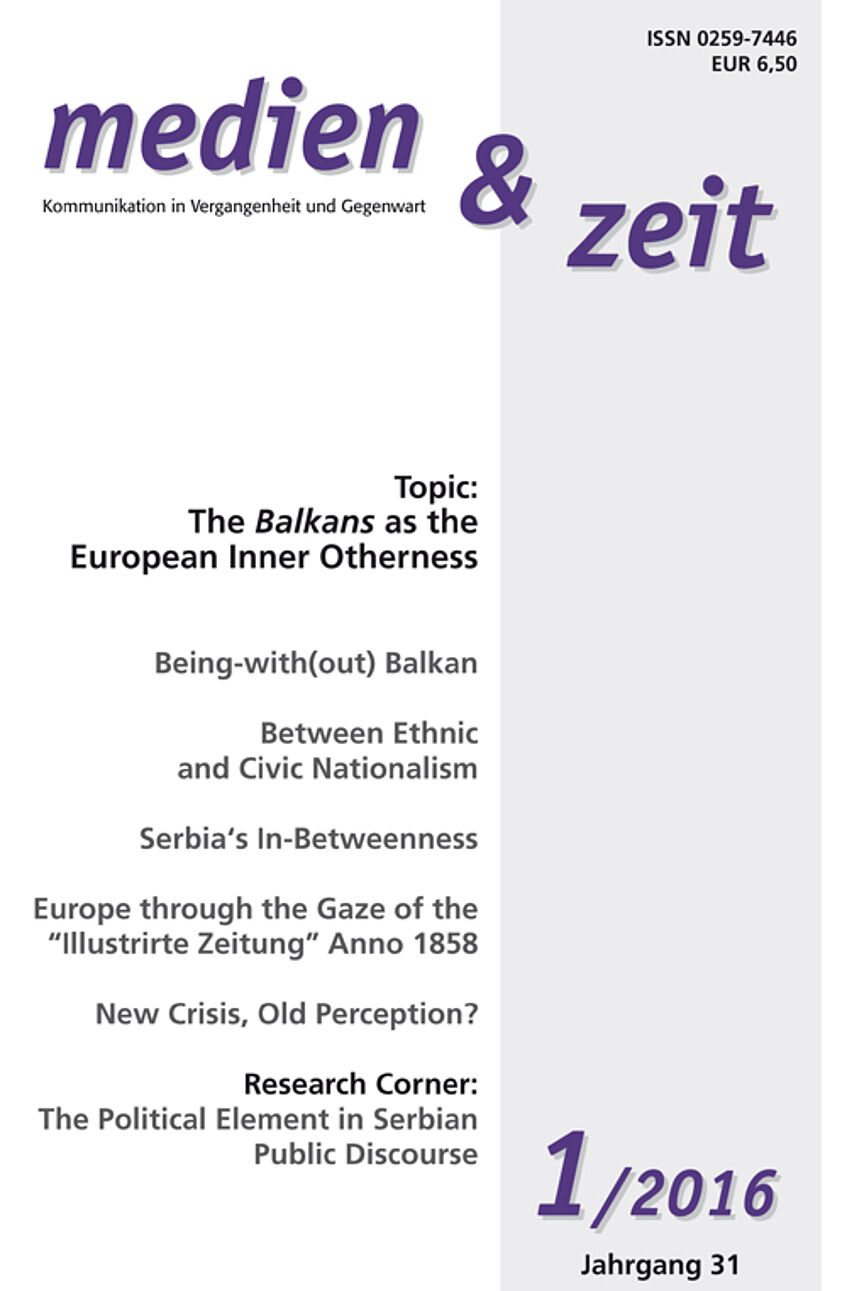Rainer Gries, Christina Krakovsky and Eva Asboth "The Balkans as the European Inner Otherness"
Rainer Gries, Christina Krakovsky and Eva Asboth
The Balkans as the European Inner Otherness
76 pages, 4 Illustrations, ISSN 0259-7446
Arbeitskreis für historische Kommunikationsforschung, Wien. Working Group for Historical Communication Research, Vienna.
In this issue the editors follow a positive approach to deconstruct historically grown inequality and exploitation without ignoring the entitlement of other arguments and without closing their minds to further debate. This point of view may help to criticize conventional terms and to reconstruct connotations in a productive and confident way.
A positive approach is particularly necessary nowadays, since questions of the future development of Europe are urgent: Considering the current political, economic, and social situation, for example the wars in the Ukraine on European soil, the remaining economic uncertainties followed by deep cuts in social expenditures, social indifference, and a decline in the helpfulness of the "European fortress", the question arises as to what exactly will remain of the European idea? It requires no prophetic gifts to already imagine that, after these fundamental upheavals, Europe must be reformulated, possibly reformatted. We will be urged again to debate the canon of its values, its history and borders, discussing the architecture of its institutions and the ways of decision-making.
The question of tomorrow raises the question of the actors within the European future: Who will be the European decision-makers of the future? Those who want to gain a perspective on the future of Europeans are well advised to focus on the many, on their identities and learn to understand social structures and their historical contexts. Focusing on the role of Southeast Europe, this issue of medien & zeit contributes to the debate for a strengthened and united future Europe.
The prelude is given by media and communication scientist Mirjana Stošić. In her paper she focuses on the significance of the specific hegemony of coded interpretations in the contemporary Western cultural relation to "cultural otherness". In a profound analysis of discourses of "otherness" she examines the West-East dichotomy and its certain discursive issues of identity and difference as well as the phenomena of race, nation, ethnic group, and class. The cultural and theoretical heritage of Balkan and the West are put in relation to each other and thus the question of Balkan is engaged as theoretically made, unmade, and remade and the consequences are defined. Stošić stimulates the thoughts about "otherness" and equips the reader to the challenge of academic debate.
The subject of identity in Bosnia and Herzegovina is raised by historian Anida Sokol in her investigation of the propaganda campaigns during the Census of 2013. In this survey, the population was given a limited choice to associate with the three traditional, ethno-national groups, hence to identify as Bosniaks, Serbs, and Croats, creating religious and national senses of belonging. The highly politicized Census was also taken as an opportunity to protest against ethno-national divisions by civil society groups and to question the constitutional privileges of particular groups of citizens, human rights and the level of state repression.
Silvia Nadjivan addresses the public discourse on the EU accession process in Serbia. With special emphasis on a detailed historic derivation Nadjivan reconstructs the paradoxical process of both aiming to belong to the EU and refusing this option. The political and communication scientist therefore demonstrates not only the difficulties of the East-West dichotomy, but depicts impressively the political protagonists and provides their historical backgrounds. Thus the paper contributes to the political assessment of the construction and policy of "Europeanness" in Serbia and the EU.
Eva Tamara Asboth's media analysis of the uprisings in the Balkans in the middle of the 19th century contributes to the conceptual history and the history of Europe’s discovery of the Balkan countries. She shows the dichotomy between an imagined civilized European community on one side, and on the other side the notion of the backwardness of European Turkey, namely Bosnia-Herzegovina, Montenegro, and Serbia circulated by the first German illustrated newspaper Illustrirte Zeitung.
In his short essay, philologist and journalist Nedad Memić gives precise insights into the medial presentation of refugees and the Balkans in Austria’s current reporting.
In the section Research Corner Christina Krakovsky presents her paper on the public involvement in political affairs, mainly with regard to Serbia. Aiming to expand the understanding of political activities, the closely entwined areas of political and cultural, artistic and civic activism are examined. The public potential of political involvement can be traced by disclosing the historical background of mutual recognition and interference as well as the formation of the current political situation. As a result, the author questions the perceived lack of democratic will to participate in the political system.

